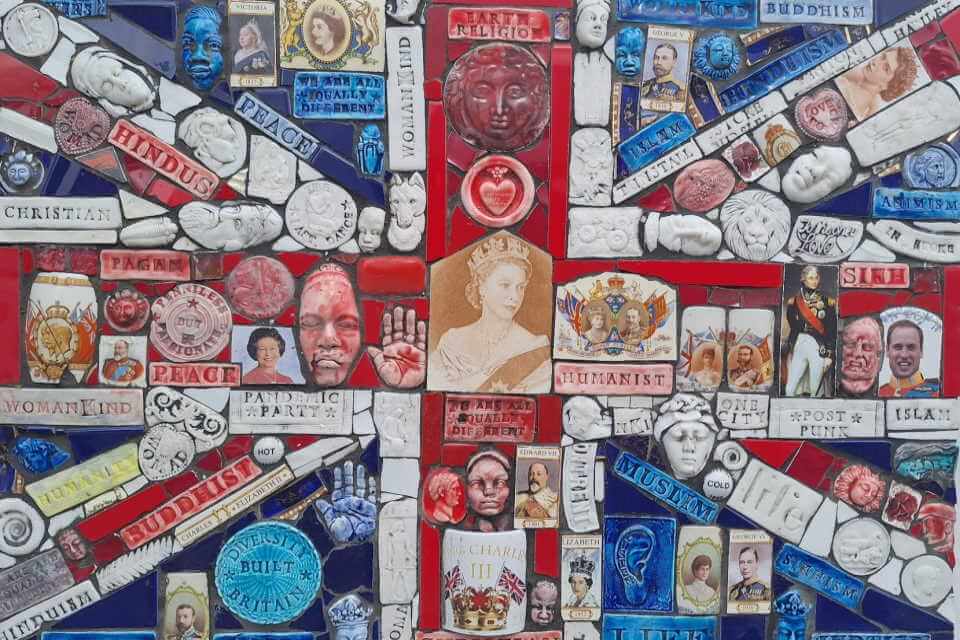Comment | Work of Philip Hardaker is one reason why World Craft City status is fitting

By Professor David Amigoni, Pro Vice-Chancellor, Research and Innovation, Keele University and Stoke Creates founder board member. This article first appeared as a column in the Stoke Sentinel in November 2024.
At Keele University, we are delighted to celebrate Stoke-on-Trent’s recent magnificent award of World Craft City status by currently exhibiting a solo retrospective of work by the great ceramic artist Philip Hardaker, active in Stoke-on-Trent since 1985. The week after ArtsKeele opened Philip’s In Our Time exhibition, which is on display in Chancellor's Building on Keele campus until December 16th, Stoke Creates invited people from across the city to celebrate the momentous international achievement of World Craft City. We all knew our city to be steeped in traditions of the ceramics craft, a heritage that continues to energise art in the present - but this was now recognised as belonging to a great international creative community.
The verdict of the international jurors who visited the city for three days in May recognised the city's achievement as a great collaborative effort, evident in 'the city's vibrant cultural ecosystem, inclusive of museums, galleries, educational institutions, and creative hubs, [which] fosters innovation and collaboration while maintaining a deep respect for tradition'. These ecosystems are many, powerful engines of connection linking cultural and social assets between not only creative hubs of crafts people and artists, but also the past, the present – and the future itself.
These ecosystems are all about partnership in which the city has become so strong. Back in May, the World Crafts Council international jurors met the ArtsKeele team at the place where we have held Keele’s Three Counties exhibition, the Burslem School of Art, since 2017. We value and enjoy staging our exhibition in the heart of the Mother Town of clay. The Three Counties is a participatory peoples' exhibition, a great opportunity for new artistic talent. We could not offer such a vibrant, accessible opportunity without our partners in Burslem and beyond.
The artist Philip Hardaker is another valued partner. As his website says of him, he 'is an accumulator, a shifter of detritus collecting the flotsam and jetsom of our wasteful consumer society and transforming these materials into art.' His work is an archaeological meeting place for traditions of making that originate in clay. His exhibition at Keele shows the way he weaves together ceramic fragments from the past, and the present, excavated from Staffordshire and all over the world. Distinctively 'these fragments of past ages along with his own modelled and cast ceramic elements of heads, animals and aeroplanes [result] in ceramic collages of considerable intricacy and beauty.' He animates ceramics by mixing clay with other materials. Using the past, his art innovates in the present, passionately articulating a commitment to social inclusion and peace in the face of international conflict since the 1980s. His focus on environmental sustainability and ecology provides an international language through which to root ourselves in the world. Philip Hardaker's ceramic art gives us a craft, an art, that can touch so many social practices and ways of thinking.
World Craft City status for Stoke-on-Trent fittingly foresees a dynamic future for ceramic materials. The juror's Consolidated Evaluation Report points to 'future applications of craftsmanship', an economic growth route to a sustainable future that will further benefit craft and artisanal skills. It identifies an overlapping scientific and commercial ecosystem 'developing new products and applications of ceramics in advanced fields.' Keele University has a strong materials science research cluster in which ceramics plays a vital role. Keele’s Science Park brings the city region another innovation hub. The opportunity the Science Park offers to co-locate with scientific excellence has resulted in some truly remarkable success stories - not least that of the company Biocomposites, which experimented with ceramic technology in orthopaedics to develop the world’s first and only calcium matrix approved for mixing with antibiotics for placing in bone and soft tissue as part of a surgeon’s infection management strategy. Keele is proud to be the home of Biocomposites, who started life in Stoke-on-Trent in 1987, around the same time that Philip Hardaker started to produce his art.
Most read
- Astronomer from Keele helps take the first close-up picture of a dying star outside our galaxy
- Keele University signs official partnership with Cheshire College South & West
- Keele partners with regional universities to tackle maternity inequalities across the West Midlands
- Keele Business School MBA ranks in Top 40 for sustainability in prestigious global ranking
- Keele trains next generation of radiographers using virtual reality in regional first
Contact us
Andy Cain,
Media Relations Manager
+44 1782 733857
Abby Swift,
Senior Communications Officer
+44 1782 734925
Adam Blakeman,
Press Officer
+44 7775 033274
Ashleigh Williams,
Senior Internal Communications Officer
Strategic Communications and Brand news@keele.ac.uk.

